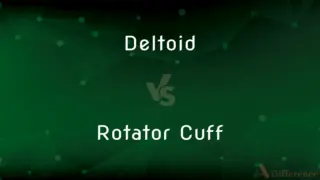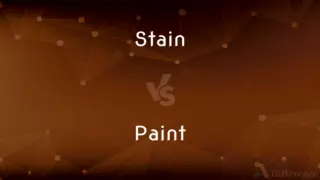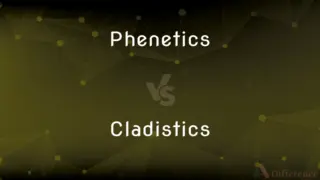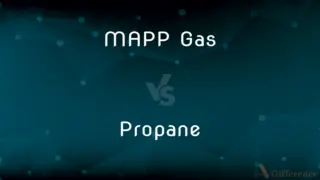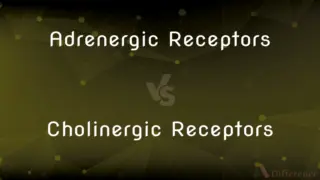Scrap vs. Obsolete — What's the Difference?
By Tayyaba Rehman & Maham Liaqat — Updated on March 28, 2024
Scrap is material discarded due to inefficiency or wear, intended for recycling or disposal, while obsolete refers to outdated items, replaced by newer versions but not necessarily for disposal.

Difference Between Scrap and Obsolete
Table of Contents
ADVERTISEMENT
Key Differences
Scrap pertains to materials or products that have reached the end of their useful life due to wear, damage, or inefficiency, and are often destined for recycling or disposal to reclaim resources. On the other hand, obsolete items are those that have become outdated or no longer useful because of technological advancements or changes in preference, but they might still retain some functionality or sentimental value.
Scrap is often generated through industrial processes, construction activities, or during the dismantling of old equipment, indicating a physical degradation that renders materials unusable in their current form. Whereas, obsolescence is more related to the progression of technology and shifts in societal standards, meaning that items become obsolete when they are superseded by more efficient, powerful, or fashionable alternatives, regardless of their physical condition.
The value of scrap is primarily in its material content; metals, plastics, and other components can be recovered and reused, reducing the need for virgin materials. Obsolete items, however, may have value beyond their material composition, such as collectible electronics or vintage fashion, where the worth is derived from rarity, nostalgia, or specific functionalities that have nostalgic appeal.
The process of handling scrap involves collection, sorting, and processing to recover usable materials, which is a critical component of industrial recycling programs aiming to minimize waste and environmental impact. In contrast, dealing with obsolete items can include repurposing, reselling, or collecting, often driven by consumer markets or specialized interest groups rather than traditional recycling routes.
While scrap material is a tangible representation of consumption and waste, providing a direct path for environmental sustainability through recycling, obsolescence reflects the pace of innovation and the changing preferences of society, offering insights into cultural and technological evolution.
ADVERTISEMENT
Comparison Chart
Definition
Material intended for recycling or disposal due to wear or damage.
Items outdated by newer versions, not necessarily due to physical condition.
Primary Cause
Physical degradation or damage.
Technological advancement or change in preferences.
Value
In the material content for recycling.
May have collectible or nostalgic value.
Handling Process
Collection, sorting, and recycling to reclaim materials.
Repurposing, reselling, or collecting based on consumer interest.
Relation to Sustainability
Direct, through material recovery and waste reduction.
Indirect, reflecting consumption patterns and technological progress.
Compare with Definitions
Scrap
Discarded material from metal processing.
The factory sells scrap metal to recyclers.
Obsolete
Outdated technology replaced by newer models.
VHS tapes became obsolete with the advent of DVDs.
Scrap
Remnants of fabric from clothing manufacturing.
Scraps of fabric were donated to the art school.
Obsolete
Terminology no longer used in modern language.
Some medical terms have become obsolete.
Scrap
Damaged components removed during repair.
The damaged engine parts were classified as scrap.
Obsolete
Fashion trends that are no longer popular.
Those styles are now considered obsolete.
Scrap
Worn-out machinery parts ready for disposal.
The old gears became scrap after years of use.
Obsolete
Discontinued software no longer supported.
The company declared the old version of the software obsolete.
Scrap
Recyclable materials from construction sites.
The construction site had bins for collecting scrap wood.
Obsolete
Practices replaced by more efficient methods.
Traditional farming techniques are becoming obsolete due to modernization.
Scrap
Scrap consists of recyclable materials left over from product manufacturing and consumption, such as parts of vehicles, building supplies, and surplus materials. Unlike waste, scrap has monetary value, especially recovered metals, and non-metallic materials are also recovered for recycling.
Obsolete
No longer in use
An obsolete word.
Scrap
A small piece or amount of something, especially one that is left over after the greater part has been used
Scraps of information
I scribbled her address on a scrap of paper
Obsolete
Outmoded in design, style, or construction
An obsolete locomotive.
Scrap
Discarded metal for reprocessing
The steamer was eventually sold for scrap
Obsolete
(Biology) Vestigial or rudimentary, especially in comparison with related or ancestral species, as the tailbone of an ape. Used of an organ or other part of an organism.
Scrap
A fight or quarrel, especially a minor or spontaneous one
He had several minor scraps with the army authorities
They were involved in a goalmouth scrap and a player was sent off
Obsolete
To cause to become obsolete
"The textbook publishers use every trick known to the marketing mind to obsolete their products year after year, thus closing off the possibility of second-hand sales" (Thomas Frank).
Scrap
Discard or remove from service (a redundant, old, or inoperative vehicle, vessel, or machine), especially so as to convert it to scrap metal
A bold decision was taken to scrap existing plant
Obsolete
(of words, equipment, etc.) No longer in use; gone into disuse; disused or neglected (often in favour of something newer).
It is speculated that, within a few years, the Internet's speedy delivery of news worldwide will make newspapers obsolete.
Scrap
Engage in a minor fight or quarrel
The older boys started scrapping with me
Obsolete
(biology) Imperfectly developed; not very distinct.
Scrap
A small piece or bit; a fragment.
Obsolete
To cause to become obsolete.
This software component has been obsoleted.
We are in the process of obsoleting this product.
Scrap
Scraps Leftover bits of food.
Obsolete
No longer in use; gone into disuse; disused; neglected; as, an obsolete word; an obsolete statute; - applied chiefly to words, writings, or observances.
Scrap
Discarded waste material, especially metal suitable for reprocessing.
Obsolete
Not very distinct; obscure; rudimental; imperfectly developed; abortive.
Scrap
Scraps Crisp pieces of rendered animal fat; cracklings.
Obsolete
To become obsolete; to go out of use.
Scrap
A fight or scuffle.
Obsolete
Old; no longer in use or valid or fashionable;
Obsolete words
An obsolete locomotive
Outdated equipment
Superannuated laws
Out-of-date ideas
Scrap
To break down into parts for disposal or salvage
Scrap an old stove.
Obsolete
No longer in use;
Obsolete words
Scrap
To discard or abandon as useless; cancel
Scrap a plan.
Scrap
To fight, usually with the fists.
Scrap
A (small) piece; a fragment; a detached, incomplete portion.
I found a scrap of cloth to patch the hole.
Scrap
The smallest amount.
I don't care a scrap.
Scrap
Leftover food.
Give the scraps to the animals: any meat to the dogs, and the rest to the hogs.
Scrap
The crisp substance that remains after drying out animal fat.
Pork scraps
Scrap
(uncountable) Discarded objects (especially metal) that may be dismantled to recover their constituent materials, junk.scrap [4]
That car isn't good for anything but scrap.
Scrap
A piece of deep-fried batter left over from frying fish, sometimes sold with chips.
Scrap
(uncountable) Loose-leaf tobacco of a low grade, such as sweepings left over from handling higher grades.
Scrap
A Hispanic criminal, especially a Mexican or one affiliated with the Sureno gang.
Scrap
(obsolete) A snare for catching birds.
Scrap
A fight, tussle, skirmish.
We got in a little scrap over who should pay the bill.
Scrap
(transitive) To discard.
Scrap
To stop working on indefinitely.
Scrap
(intransitive) To scrapbook; to create scrapbooks.
Scrap
(transitive) To dispose of at a scrapyard.
Scrap
(transitive) To make into scrap.
Scrap
To fight
Scrap
Something scraped off; hence, a small piece; a bit; a fragment; a detached, incomplete portion.
I have no materials - not a scrap.
Scrap
Specifically, a fragment of something written or printed; a brief excerpt; an unconnected extract.
Scrap
The crisp substance that remains after drying out animal fat; as, pork scraps.
Scrap
Same as Scrap iron, below.
Scrap
A small fragment of something broken off from the whole;
A bit of rock caught him in the eye
Scrap
Worthless material that is to be disposed of
Scrap
A small piece of something that is left over after the rest has been used;
She jotted it on a scrap of paper
There was not a scrap left
Scrap
The act of fighting; any contest or struggle;
A fight broke out at the hockey game
There was fighting in the streets
The unhappy couple got into a terrible scrap
Scrap
Dispose of (something useless or old);
Trash these old chairs
Junk an old car
Scrap your old computer
Scrap
Have a disagreement over something;
We quarreled over the question as to who discovered America
These tewo fellows are always scrapping over something
Scrap
Make into scrap or refuse;
Scrap the old airplane and sell the parts
Scrap
Disposed of as useless;
Waste paper
Common Curiosities
How does an item become obsolete?
An item becomes obsolete when newer, more efficient or fashionable versions replace it, regardless of its physical condition.
Is there any value in scrap?
Yes, scrap has material value, especially metals and plastics, which can be recycled and reused in various applications.
Are all scraps recyclable?
Not all scraps are recyclable; the recyclability depends on the material composition and the availability of recycling facilities.
What makes an item scrap?
An item becomes scrap when it is no longer functional or efficient due to wear, damage, or age, and is destined for recycling or disposal.
Can obsolete items be scrapped?
Yes, obsolete items can be scrapped, especially if they no longer serve any purpose or hold no sentimental or collectible value.
What's the difference between recycling and scrapping?
Recycling involves processing materials to make them usable again, while scrapping is the act of discarding or dismantling items for recycling.
What role does technology play in obsolescence?
Technology plays a critical role in obsolescence, as advancements lead to the development of more efficient or desirable replacements for existing items.
How do societal trends influence obsolescence?
Societal trends influence obsolescence through changing preferences and demands, leading to the rapid replacement of items considered unfashionable or outdated.
Why do people collect obsolete items?
People collect obsolete items for their nostalgic value, rarity, or specific functionalities that appeal to collectors or enthusiasts.
Can obsolete technology be recycled?
Yes, obsolete technology can often be recycled, especially the components that contain valuable materials like metals.
What is planned obsolescence?
Planned obsolescence is a strategy where products are designed to have a limited lifespan or become outdated quickly, encouraging consumers to purchase newer models.
How does obsolescence affect the environment?
Obsolescence can lead to increased waste and consumption as items are discarded for newer versions, impacting environmental sustainability.
How can businesses manage scrap effectively?
Businesses can manage scrap effectively by implementing recycling programs, reducing waste, and finding ways to repurpose or sell scrap materials.
Can obsolescence be beneficial?
Obsolescence can be beneficial by driving innovation and technological advancements, though it also poses challenges for sustainability and waste management.
What are the environmental implications of scrapping?
The environmental implications of scrapping include both positive effects, such as material recovery and waste reduction, and negative impacts related to the disposal of non-recyclable components.
Share Your Discovery

Previous Comparison
Nationality vs. Citizenship
Next Comparison
Bud vs. BuddyAuthor Spotlight
Written by
Tayyaba RehmanTayyaba Rehman is a distinguished writer, currently serving as a primary contributor to askdifference.com. As a researcher in semantics and etymology, Tayyaba's passion for the complexity of languages and their distinctions has found a perfect home on the platform. Tayyaba delves into the intricacies of language, distinguishing between commonly confused words and phrases, thereby providing clarity for readers worldwide.
Co-written by
Maham Liaqat














